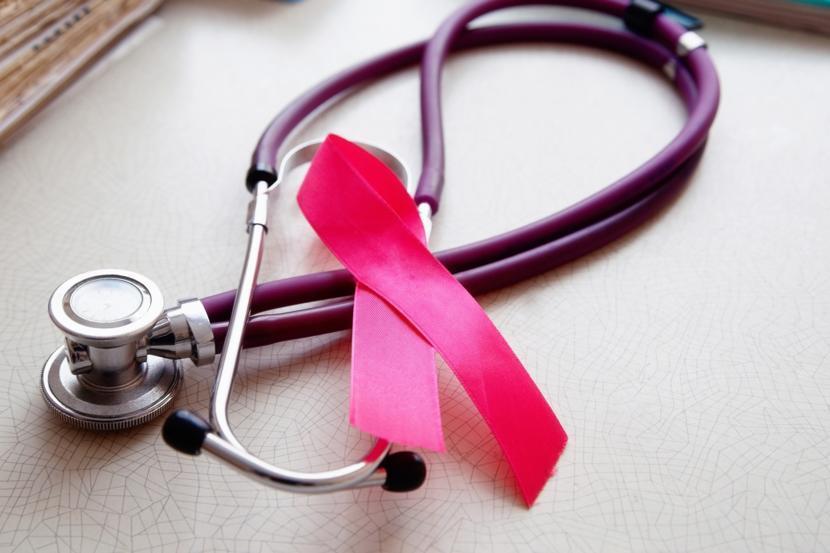Breast Cancer: New Research Confirms Deodorant Use Is Okay During Radiotherapy

Antiperspirant is okay to wear while undergoing radiation treatment. That’s the finding from a recent study by the Perelman School of Medicine at the University of Pennsylvania.
The study also concluded many doctors continue to advise patients against use of antiperspirants during radiotherapy, to the detriment of the patient’s quality of life and confidence.
“This study shows providers should be more liberal in letting patients use antiperspirants during radiation treatment, which may improve patient quality-of-life,” said Dr. Brian C. Baumann, lead researcher for the study.
The Science Behind Sweat
To better understand the findings, it’s worth taking a moment for a refresher on the science of sweat and the beauty products we turn to for help.
In addition to common sweat glands tasked with cooling down the body, your armpit has apocrine sweat glands. These glands produce a fat and protein mixture that is secreted, most commonly, when you experience emotional stress. The fat and protein then mix with the natural bacteria in your armpits, causing a foul odor.
Deodorants cut down on the bacteria in your armpits through ingredients like triclosan, thereby cutting out the odor when you do sweat. Antiperspirants prevent you from sweating all together by plugging your apocrine sweat glands with ingredients like aluminum. Normal antiperspirants contain around 15 percent aluminum (listed as “aluminum zirconium tetrachlorohydrex glycinelook”) and extra strength products carry as much as 25 percent.
The Research
During radiotherapy, it was believed the metals commonly found in antiperspirants could scatter the radiation signal, sending it off target to healthy areas. It was believed these “off target” instances reduced the dosage and therefore the effectiveness of the treatment.
In this 2017 study, researchers from the Perelman School of Medicine studied the surface absorption rate of radiotherapy doses on samples with varying degrees of metallic-based antiperspirant: none, normal, and extra strength. There was no significant difference among the three groups, even when the radiation beam’s position was altered, meaning antiperspirants did not make a difference.
In addition to the study’s findings, the research team found no previous research about the adverse impacts of antiperspirants. Despite this, a small survey conducted as part of the research found a large majority of doctors (82 percent) advised against antiperspirants.
Dr. Baumann said in a press release about the research that the myth’s origin may be how skin toxicity is measured following radiation. “The current skin toxicity scoring system has important limitations,” Dr. Baumann said. “It does not take pain or itching into account, for example, so it is possible that the studies may have missed a clinically meaningful effect because of the limitations of the measurement tool.”
Doctors evaluate the impact of radiation treatment on a patient’s key organs, like the skin, using a system such as the RTOG/EORTC Scoring Schema. Impact is assigned Grade 0 to Grade 5, depending on observed symptoms.
When patients reported itchy or sore skin away from the direct radiation site, doctors may have concluded some of the radiation signal was scattered, leading to the recommendation against antiperspirant.
Such a dramatic change in hygiene routines like eliminating antiperspirant, however, may cause patients anxiety.
“Going without antiperspirants entirely for a three-to-six-week course of radiotherapy can have a negative impact on a patient’s quality-of-life,” said Dr. Baumann.
Alternative Antiperspirants
Even as you continue to use antiperspirant during breast radiation therapy, be conscious of the ingredients of your hygiene product as your armpits are likely to experience sensitivity because of their proximity to the breast. Consider switching to a brand that is fragrancy free and recommended for sensitive skin.
While there are rumors of the correlation between metals in antiperspirants and cancer, no scientific research has proven the link. However, if you are looking to make a change or still concerned about advice from your doctor not to wear metal-based antiperspirants during radiotherapy, a host of “natural” antiperspirants are available on the market. These products switch out the aluminum for ingredients like eucalyptus, sage, lemon, and even crystals.
To try a natural antiperspirant, simply look for the “no aluminum” label, avoid ingredient lists with “aluminum zirconium tetrachlorohydrex glycinelook,” or look for online product reviews that list ingredients and the effectiveness of each product.
As with any change in products or habits, consult with your doctor so they can alert you to options or potential risks.
Dealing with Sensitive Skin During Radiotherapy
While cutting out antiperspirant during radiation is now shown to be unnecessary for treatment effectiveness, it is necessary to protect your skin when possible as you undergo therapy. As many as 90 percent of radiotherapy patients will suffer some form of radiation dermatitis, a medical term for skin irritated by radiation beams.
Discomfort will range from mild to severe. For example, red and irritated skin is expected at the top corner of the breast, underneath, and in the armpit, because of skin-to-skin rubbing or the angel of the radiation beam. Additionally, certain groups of people are more prone to soreness: those with fair complexions, large breasts, a previous mastectomy, or recent chemotherapy.
Sever skin reactions during the course of treatment, such as open blisters and peeling skin, could cause infection or treatment to stop. Your treatment team can provide tips to prevent or treat sensitive skin, which may include the following.
Avoid tight clothes or those with embellishments that might rub against the breast or armpit. At the same time, try to avoid skin-to-skin contact in especially sensitive areas by wearing loose cotton shirts and wearing a strong bra without an underwire to keep your breasts lifted and separated.
Avoid touching or picking at the sensitive areas, or applying lotions or sprays with a fragrance. On the advice of your doctor, try applying kitchen cornstarch with a clean makeup brush to help absorb moisture and reduce rubbing. Try putting a soft cloth on the impacted areas, switching up the cloth frequently to avoid sticking due to sweat and moisture.
Avoid treating irritated skin with ice or heat. These extreme temperatures can cause the skin to blister or peel, which could lead to infection. Many doctors recommend taking warm showers only and avoiding letting water fall directly on the areas targeted for radiation, such as the breast.
Avoid the sun as your skin will be especially sensitive to UV rays. Check with your doctor before using sunblock, as it may irritate the skin. When traveling outside, consider a large-brimmed hat, long sleeves, and long trousers or skirts. Remember UV rays are present even during cloudy weather.
Avoid smoking as it increases the time it takes your skin to heal. Also avoid rooms with heavy smoke as the secondary contact can irritate your skin.
Follow a healthy diet that promotes strong skin. This includes fish with natural oils, vegetables, fruits, and plenty of water to hydrate your skin.
The Bottom Line
Undergoing radiotherapy is a dramatic event with expected lifestyle changes, but changing your antiperspirant routine doesn’t need to be one of them. It is a common myth that antiperspirants will cause radiation to spread due to the presence of metals such as aluminum.
While you can wear antiperspirants without an impact to the effectiveness of your treatment, be sensitive to your skin and what you put on your body. Skin irritation is very likely as you undergo radiation therapy, but it can be managed with help from your medical team.
References
http://health.howstuffworks.com/skin-care/underarm-care/tips/deodorant-antiperspirant1.htm
http://www.breastcancer.org/treatment/radiation/skin/reactions
https://www.cancer.org/treatment/treatments-and-side-effects/treatment-types/radiation/coping.html















